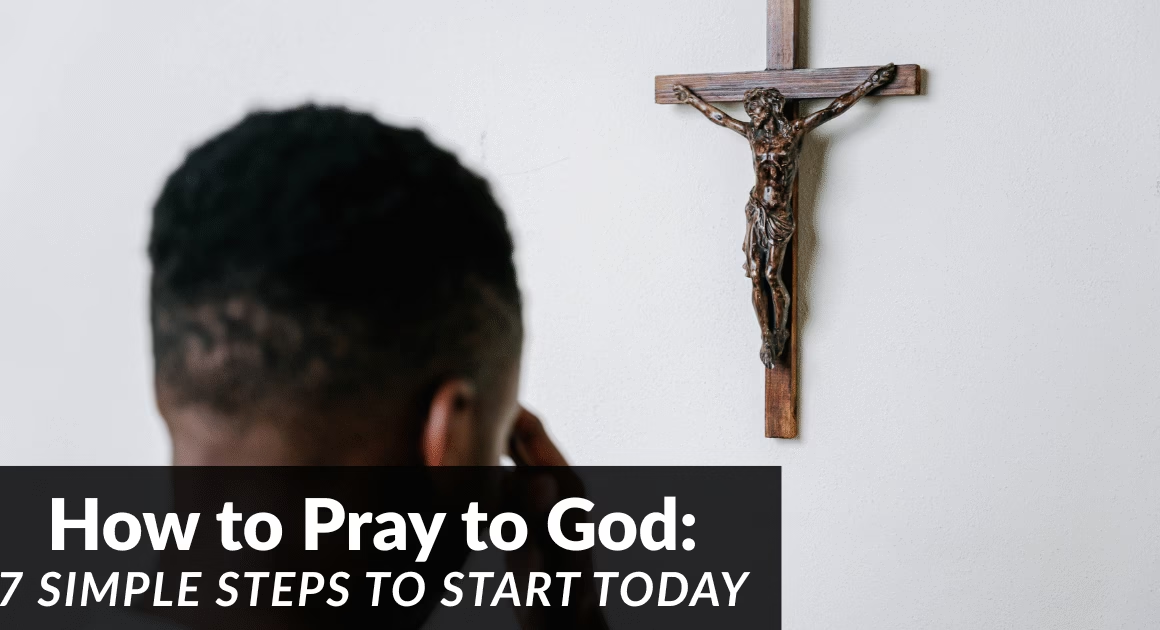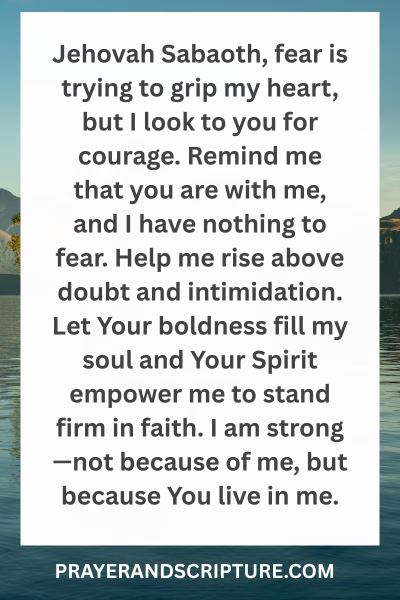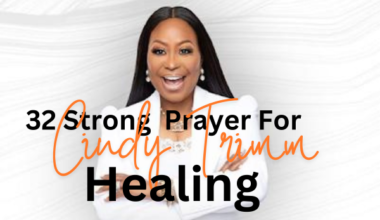You’re here because something in your heart is calling out to God. Maybe life feels overwhelming. Maybe you’re grateful. Or maybe… you just want to learn how to connect with your Creator. The good news? You can start today. In this guide—How to Pray to God: 7 Simple Steps to Start Today—you’ll discover that prayer isn’t complicated or reserved for the super-spiritual.
Prayer isn’t just for pastors, prophets, or “spiritual people.” It’s a divine invitation from God to you—to speak, to listen, and to be loved. In this guide, we’ll walk through 7 simple steps on how to pray to God, backed by Scripture and practical examples. You don’t need perfect words. You just need an open heart.
What Is Prayer According to the Bible?
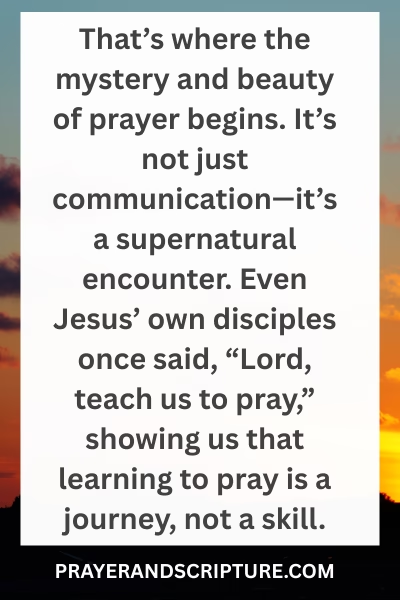 Prayer is simply talking with God, your Creator, your Father, your closest Friend. It’s where you express gratitude, seek help, admit faults, or just pour out your heart. But prayer isn’t just about asking for things—it’s about building a relationship.
Prayer is simply talking with God, your Creator, your Father, your closest Friend. It’s where you express gratitude, seek help, admit faults, or just pour out your heart. But prayer isn’t just about asking for things—it’s about building a relationship.
Still, many wonder: How do I really connect with a holy, infinite God?
That’s where the mystery and beauty of prayer begins. It’s not just communication—it’s a supernatural encounter. Even Jesus’ own disciples once said, “Lord, teach us to pray,” showing us that learning to pray is a journey, not a skill.
Prayer is not a ritual. It’s not performance. It’s a divine conversation.
The Bible shows prayer as:
Hannah pouring out her soul in silence (1 Samuel 1)
David crying for help and praising God in the Psalms
Jesus retreating to lonely places to pray (Mark 1:35)
“Call to me and I will answer you and tell you great and unsearchable things you do not know.” – Jeremiah 33:3
“But when you pray, go into your room, close the door and pray to your Father, who is unseen.” – Matthew 6:6
Learn more about why prayer is essential and how it impacts every part of your spiritual growth.
Why Should You Pray?
Prayer strengthens your relationship with God. Just like friendships grow through talking, your faith grows through prayer.
faith grows through prayer.
Here’s why you should pray:
To express love and worship: Acknowledge who God is.
To ask for help: Life is too hard to handle alone.
To receive forgiveness: Prayer leads to peace and restoration.
To give thanks: Gratitude brings joy and perspective.
“The Lord is near to all who call on him.” – Psalm 145:18
These 10 beginner tips will guide you on your first steps toward powerful daily prayer.
How to Pray According to Jesus
Jesus gave us a clear prayer model in Matthew 6:9–13, known as the Lord’s Prayer:
Praise God’s name: “Our Father in heaven, hallowed be your name”
Submit to His will: “Your kingdom come, your will be done”
Ask for daily provision: “Give us today our daily bread”
Seek forgiveness: “Forgive us our sins”
Request protection: “Deliver us from evil”
This is not a script—it’s a structure. You can pray using this as a guide.
Discover how Jesus structures prayer and How to deepen your own rhythm.
What to Say When You Pray to God
If you’re unsure what to say, start like this:
“God, I’m here. I need you.”
“Father, I feel lost. Help me find peace.”
“Thank you for waking me up today.”
“Jesus, I trust You. Lead me.”
The Holy Spirit will help you. Don’t worry about fancy words.
For tips on structuring meaningful prayer, read this powerful breakdown.
“Before a word is on my tongue, You, Lord, know it completely.” – Psalm 139:4
How to Pray to God for a Miracle
Miracles are still happening, and prayer is often the catalyst.
To pray for a miracle:
Believe: “Nothing is impossible with God” (Luke 1:37)
Be specific: Ask boldly.
Surrender: Trust God’s timing and way.
Declare Scripture: “Whatever you ask in prayer, believe that you have received it, and it will be yours.” – Mark 11:24
Miracles aren’t magic tricks. They are God’s way of showing His power and love.
Learn how to pray boldly and biblically for miracles.
How to Pray to God for Forgiveness
Sin creates distance between us and God—but prayer restores that connection.
Use Psalm 51 as your prayer model:
Admit the sin
Ask for cleansing
Receive His grace
Sample Prayer:
“Lord, I’ve messed up. I confess my sin. Please forgive me and wash me clean. Thank You for Your mercy and love.”
“If we confess our sins, He is faithful and just to forgive.” – 1 John 1:9
Here’s how to pray Scripture-based confessions.
7 Simple Steps to Pray to God
If you’re new to prayer, start with these steps:
1. Find a Quiet Place – Eliminate distractions. (Mark 1:35)
To truly connect with God, choose a place where your heart and mind can be still. Jesus often withdrew to quiet places to pray. In the noise of life, silence creates space for God to move. Turn off your phone, shut the door, and let your spirit settle. You don’t need a perfect setting—just an open heart and a moment of peace.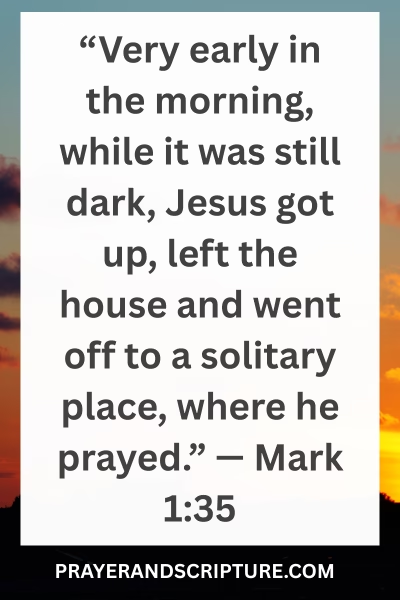
“Very early in the morning, while it was still dark, Jesus got up, left the house and went off to a solitary place, where he prayed.” — Mark 1:35
2. Open with Praise – Acknowledge who God is. (Psalm 100:4)
Start your prayer by lifting up God’s name. Worship Him for His goodness, power, and faithfulness. Let your spirit rise in reverence and adoration. Praise reminds your soul of who you’re speaking to—the Creator of all things, your heavenly Father.
“Enter his gates with thanksgiving and his courts with praise; give thanks to him and praise his name.” — Psalm 100:4
3. Confess Your Sins – Be honest. He already knows. (Psalm 51)
God desires honesty, not perfection. Bring your failures to Him—no matter how big or small. Confession is not about shame but about healing and restoration. When we admit our sins, we invite His mercy to cleanse us.
“Create in me a pure heart, O God, and renew a steadfast spirit within me.” — Psalm 51:10
4. Thank Him for Blessings – Gratitude shifts your heart. (1 Thessalonians 5:18)
 Thankfulness realigns your focus. Instead of dwelling on what’s missing, you begin to see how much God has already done. Gratitude brings joy, peace, and deeper trust. Name specific things you’re grateful for—both big and small.
Thankfulness realigns your focus. Instead of dwelling on what’s missing, you begin to see how much God has already done. Gratitude brings joy, peace, and deeper trust. Name specific things you’re grateful for—both big and small.
“Give thanks in all circumstances; for this is God’s will for you in Christ Jesus.” — 1 Thessalonians 5:18
5. Present Your Requests – Ask boldly. (Philippians 4:6)
God invites you to bring your needs, desires, and burdens to Him. Don’t be afraid to ask. Whether it’s provision, healing, guidance, or help in crisis, He listens. Be specific. Be bold. He is your Father who loves to give good gifts.
“Do not be anxious about anything, but in every situation, by prayer and petition, with thanksgiving, present your requests to God.” — Philippians 4:6
6. Listen in Silence – Give space for God to speak. (Psalm 46:10)
Prayer is not just talking—it’s also listening. After you’ve spoken, pause. Breathe. Let His peace wash over you. Sometimes God speaks through Scripture, a quiet nudge in your spirit, or simply by giving you a deep sense of assurance.
“Be still, and know that I am God.” — Psalm 46:10
7. Close in Jesus’ Name – He is your access to God. (John 14:13)
End your prayer by recognizing the name that gives you authority to speak to God—Jesus. His death and resurrection opened the way for us to boldly approach the throne of grace. Praying in Jesus’ name aligns your heart with His will and unlocks heavenly power.
“And I will do whatever you ask in my name, so that the Father may be glorified in the Son.” — John 14:13
10 Examples of How to Pray to God
Common Prayer Mistakes to Avoid
1. Rushing – Don’t treat prayer like a task
Prayer isn’t a checklist item to hurry through before moving on to your next to-do. When we rush, we miss the relationship. God isn’t after perfect words—He desires your presence. Set aside time, even if it’s just a few quiet minutes. Let your heart settle. Let the moment breathe. Slow down. Think of prayer not as a duty, but as a daily meeting with Someone who loves you more than you can imagine.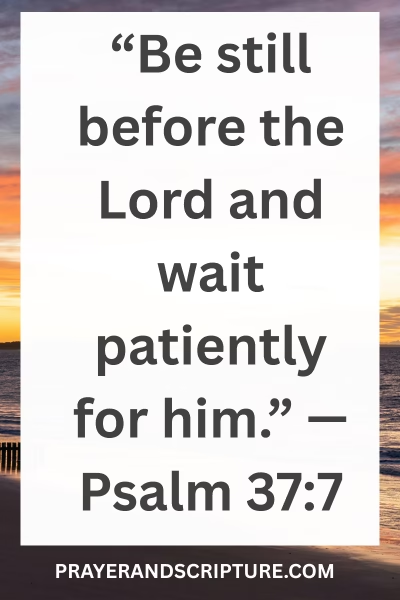
“Be still before the Lord and wait patiently for him.” — Psalm 37:7
2. Repetition without heart – Mean what you say
It’s easy to fall into autopilot mode, repeating words we’ve heard before, especially when we’re tired or unsure. But God isn’t moved by formulas. He’s moved by sincerity. Even a few heartfelt words mean more than many empty ones. Speak to Him from where you truly are—raw, real, and honest. That’s where real connection happens.
“These people honor me with their lips, but their hearts are far from me.” — Matthew 15:8
3. Only asking, never listening – Prayer is two-way
Many people approach prayer like a shopping list—presenting requests and quickly signing off. But prayer is a conversation, not a monologue. Yes, bring your needs to God, but also take time to listen. Pause. Reflect. Let His Spirit whisper peace, direction, or even conviction. Often, His voice is found in stillness.
“Speak, Lord, for your servant is listening.” — 1 Samuel 3:10
4. Thinking you’re not “spiritual enough” – God wants YOU
You don’t need to be a pastor, prophet, or perfect Christian to pray. Prayer isn’t for the “super spiritual”—it’s for the broken, the busy, the doubting, the seeking, the tired… it’s for you. Don’t let guilt or insecurity keep you away. God isn’t waiting for a polished version of you—He’s simply waiting for you.
“Let us then approach God’s throne of grace with confidence…” — Hebrews 4:16
What Time Should You Pray?
There’s no perfect time. The best time is when your heart is open.
Early morning (Mark 1:35)
Midnight (Acts 16:25)
Before bed (Psalm 4:8)
All day (1 Thess. 5:17)
Can You Pray Silently or in Your Mind?
Yes! God hears silent prayers.
“Hannah was praying in her heart… the Lord remembered her.” – 1 Samuel 1:13, 19
Does God Always Answer Prayers?
Yes—but not always how or when we expect.
Yes – Immediate answer
No – He has something better
Wait – Timing isn’t right yet
Trust His perspective, not your pressure.
How Long Should a Prayer Be?
Prayer doesn’t need to be long. Even “Lord, help me!” is powerful.
Jesus’ model prayer (Matthew 6) is only about 70 words. It’s not about length—it’s about heart.
Can You Pray While Walking, Driving, or Working?
Yes! You don’t have to be on your knees.
Prayer is portable. It fits into your commute, your chores, your walks.
“Pray without ceasing.” – 1 Thessalonians 5:17
What If You Don’t Know What to Say?
The Holy Spirit will help you.
“The Spirit helps us in our weakness… He intercedes for us with groans too deep for words.” – Romans 8:26
Say, “Lord, teach me how to pray.” That’s enough to begin.
How Can You Hear God’s Voice in Prayer?
One of the most beautiful truths about prayer is this: God listens—and He also speaks. But His voice is often gentle, not loud or dramatic. Hearing God requires a heart that’s willing to wait, listen, and respond. So, how does He speak?
1. Through His Word
The Bible is God’s voice in written form. Every time you open it, you’re opening yourself to hear Him. When you pray, ask Him to speak to you through Scripture. A verse might suddenly feel alive and relevant—that’s Him. His Word is always consistent with His nature, and it’s one of the safest ways to discern His voice.
“Your word is a lamp to my feet and a light to my path.” — Psalm 119:105
2. Through Peace in Your Heart
When you’ve prayed about something and suddenly feel a calm assurance—even if nothing has changed—that may be God’s voice. He often speaks through peace, gently quieting our fears and replacing confusion with clarity. If your spirit feels settled and rested, that’s a good sign He’s spoken.
“Let the peace of Christ rule in your hearts…” — Colossians 3:15
3. Through Gentle Impressions
God often communicates through soft nudges—thoughts, ideas, or burdens that align with His truth. It may not be audible, but it’s clear. You might sense, “Call this person,” or “Forgive them now.” These impressions aren’t forced; they gently press on your heart, prompting you to act or reflect.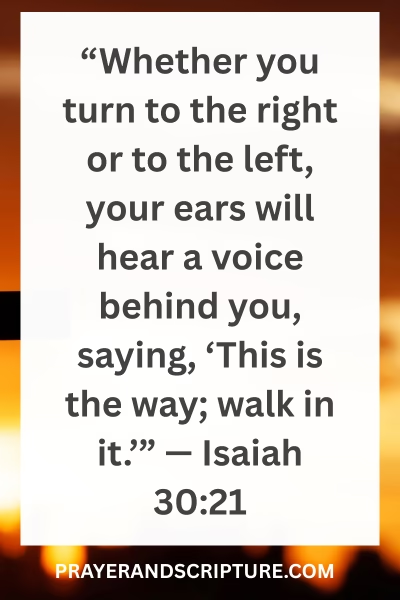
“Whether you turn to the right or to the left, your ears will hear a voice behind you, saying, ‘This is the way; walk in it.’” — Isaiah 30:21
4. Through Confirmation from Others
God can use other people to confirm what He’s already saying to you—through a sermon, a song, a conversation, or even a passing comment. When something keeps coming up repeatedly, especially in unexpected ways, pay attention. He often affirms His guidance through multiple channels.
“Plans are established by seeking advice…” — Proverbs 20:18
5. By Staying Still and Expecting a Response
God speaks most often to those who make room for Him. If you rush through prayer and walk away, you may miss what He wants to say. But if you stay still, wait with expectancy, and tune your heart to His Spirit, He will respond. Not always instantly—but always faithfully.
“Be still, and know that I am God.” — Psalm 46:10
God is not silent.
He delights in communicating with His children. If you’ll slow down, listen with a surrendered heart, and stay anchored in His Word, you will begin to recognize His voice more clearly every day.
Should You Use Written Prayers or Speak Freely?
Both are powerful.
Speak freely when your heart overflows
Use written prayers when you need structure or strength
Even Jesus gave us a “written” model to follow.
What Role Does the Holy Spirit Play in Prayer?
The Holy Spirit:
Helps you when you don’t know how to pray
Fills your words with power
Reveals God’s heart to you
Let Him guide your prayer life daily.
Explore how the Spirit strengthens prayer and gives you power beyond your own strength.
Can You Pray with Other People?
Yes!
Prayer in agreement is powerful.
“If two of you agree on earth about anything they ask, it will be done.” – Matthew 18:19
Family prayers. Group prayers. Church intercession. Heaven moves when we unite.
Ways to Develop a Life of Prayer
1. Set a Regular Prayer Time
Consistency builds habits. Choose a specific time each day—morning, lunch break, or bedtime—and commit it to God. When prayer becomes part of your daily rhythm, it no longer feels like a task but a natural part of life.
2. Keep a Prayer Journal
Write down your thoughts, prayers, and God’s answers. This deepens your spiritual memory and strengthens your faith when you look back and see how God moved. Journaling also helps you stay focused and honest with God.
3. Join a Prayer Group
Praying with others sharpens your spiritual discipline and builds community. It teaches you new ways to pray and increases accountability. Whether in church, online, or with friends, there’s power in corporate prayer (Matthew 18:20).
4. Use Scripture to Guide Your Words
The Bible is filled with prayers and promises you can personalize. Praying God’s Word aligns your heart with His will and deepens your understanding of His nature. Psalms, in particular, are great for emotional and spiritual expression.
5. Pray Out Loud During Your Walk or Commute
Turn daily routines into divine moments. Speak to God as you drive, walk, or do chores. This transforms ordinary moments into spiritual conversations and helps you stay connected to Him throughout the day.
6. Start Small, But Stay Consistent
Even five minutes a day can grow into more. Don’t wait for the “perfect moment” or environment. God simply wants you to start, no matter how simple or short.
7. Use Prayer Prompts or Guides
If you struggle to know what to say, use daily devotionals or prayer prompts. They can help you focus and prevent your mind from wandering.
8. Talk to God Like a Friend—With Reverence
While God is holy, He’s also your Heavenly Father. Speak to Him honestly. You don’t need big words. He already knows your heart—just be real.
9. Set Prayer Reminders on Your Phone
If you’re busy, let your phone be a tool for your spiritual life. A simple daily alarm labeled “Talk to God” can change your entire day.
10. Celebrate Progress, Not Perfection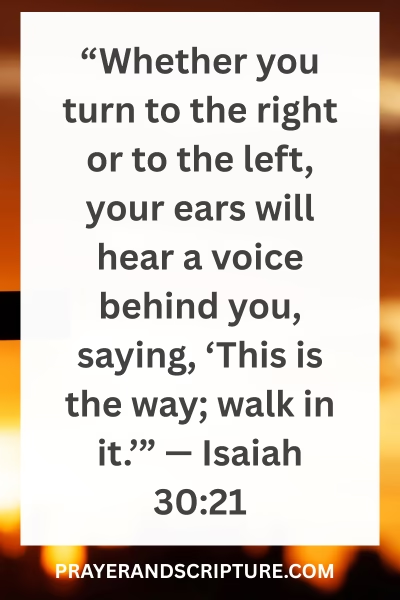
A life of prayer is built over time. Don’t get discouraged if you miss a day or feel dry. Just return to Him. Every effort counts in building intimacy with God.
These 12 strategies will help you keep your prayers aligned and consistent.
FAQs About How to Pray to God
1. Do I have to kneel or close my eyes to pray?
Not at all. While kneeling or closing your eyes can help you focus, God is more concerned with your heart than your posture. You can pray while walking, driving, or even lying down.
2. What if I don’t know what to say when I pray?
Start with honesty. Tell God exactly how you feel. The Holy Spirit will guide your words (Romans 8:26). You can also use Scripture, Psalms, or written prayers as a starting point.
3. How long should a prayer be?
There’s no perfect length. God isn’t timing you. A heartfelt two-minute prayer can be more powerful than a twenty-minute monologue filled with empty words. What matters is sincerity and faith.
4. Can I pray silently in my mind?
Yes. God hears your thoughts just as clearly as your spoken words. Silent prayers are still powerful and intimate.
5. Will God really answer my prayer?
Yes—but sometimes not in the way or timing you expect. God answers with a “yes,” “no,” or “wait,” all in perfect wisdom and love (Jeremiah 29:11).
Conclusion
Prayer is not a ritual—it’s a relationship. Whether you whisper a short prayer in the middle of your day or spend an hour pouring out your soul, God is always listening. He’s not waiting for perfect words; He’s waiting for your open heart. Don’t let fear, guilt, or inexperience hold you back. Begin where you are, with what you have. Prayer can transform your day—and your life.
